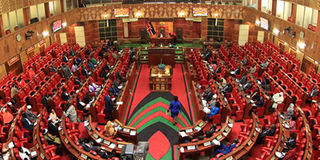Politicians’ greed undermines equality and security in society

The National Assembly in session on November 21, 2018. Before politicians think of higher perks, they have to first consider the poorest of poor Kenyans. PHOTO | FILE | NATION MEDIA GROUP
What you need to know:
- The political class has made wealth creation its preserve by unfairly advocating a systematic rise in their remuneration at the expense of social programmes.
- The level of violence associated with the clamour for political office is inspired partly by the ‘my turn to eat’ concept, not public service.
Welfare governments formed in the West after the First World War were aimed at creating a society with a conscience for the less well-off by promoting economic and social well-being.
The sole purpose was to create equality through fair distribution of wealth. The governments had a responsibility to fund social programmes such as housing, healthcare and education.
Primarily, it made sure that those unable to fend for themselves are catered for as well. No one was left to suffer social indignities.
This is something that is partly being addressed in Kenya within the ‘Big Four’ agenda — housing, healthcare, manufacturing and food security.
The first two appear ready for take-off. Food security seems to stare at the challenges of corruption and time will tell if we can streamline the agricultural sector soon enough to achieve this goal.
POVERTY
Food security is anchored on the premise that Kenya will be food secure in the coming years to adequately feed its people.
The price of staple food such as maize flour is controlled to make sure it is affordable to most Kenyans. Is this being achieved?
The concern is mainly with the urban poor, who may struggle to feed themselves if they are unable to find work or run small businesses in the residential estates and slums.
This is a group that now provokes the idea of ‘welfarism’ in Kenya. It is time we thought of extending financial help to those unable to meet their basic needs.
The ‘Big Four’ agenda is well-intentioned but has not, perhaps, considered that, despite its affordability of social programmes, there are those who would still be left struggling to meet essential needs such as food, clothing and shelter.
Before politicians think of higher perks, they have to first consider the poorest of poor Kenyans.
INEQUALITY
Wealth distribution appears to be lopsided. The political class has made wealth creation its preserve by unfairly advocating a systematic rise in their remuneration at the expense of social programmes.
We run the risk of an unequal society (if we don’t have one already).
The accumulation of wealth by a small minority undermines the work of the government. In the absence of the welfare state, the next best thing is fair distribution of salaries to ensure the income gap is as narrow as possible.
An unequal distribution of wealth would result in underpaid demoralised public servants and an unequal society.
This has the potential of undermining many facets of our lives, starting with the bribery culture — particularly among police and Immigration officers, which alone could have serious consequences for national security.
There have been reforms within the police service but I strongly believe this is not enough.
CORRUPTION
These are people in whose hands we have entrusted our security, and therefore deserve to be looked after well to take away temptations of bribery.
What inspires many jobless Kenyans to join the police is not the salary but an opportunity to be bribed to riches.
The same can be said for many politicians, who literally fight their way into office and keep fighting to increase their salaries and allowances.
The level of violence associated with the clamour for political office is inspired partly by the ‘my turn to eat’ concept, not public service.
The implication of this level of abuse of power by public servants and the political class is an increase in poverty.
The wealth pendulum only swings the way of those who can unjustifiably influence a rise in their remuneration.
If we are to add corruption to the ills that beleaguer us, social programmes will continue to suffer due to lack of funding.
GREED
An unequal society is a ticking time bomb. It eventually goes off through an increase in crime and general social disorder — because, as it is rightly put, ‘the have-nots will take away from the haves’ through violence.
This is already evident, given the level of violent crimes experienced in our major cities.
Kenyan MPs put the parliaments in wealthier countries to shame by being one of the highest-paid in the world. Their insatiable greed is driving many Kenyans to penury.
Politicians ought to put money into Kenyans’ pockets through well-paying jobs and welfare, so that they can afford their own food and funeral.
It is insensitive to say politicians need more money so that they can throw crumbs at their constituents. Their role is to create a wealthy nation, not one for beggars!
Any more salary raise for politicians will be a travesty. It is unjustified as it makes a mockery of many Kenyans struggling to put food on the table.
Greed needs to be tamed. Richer together would enhance equity in the society and there is every reason to aim for one — if only for our dignity and prosperity.
Ms Guyo is a legal researcher. [email protected]





